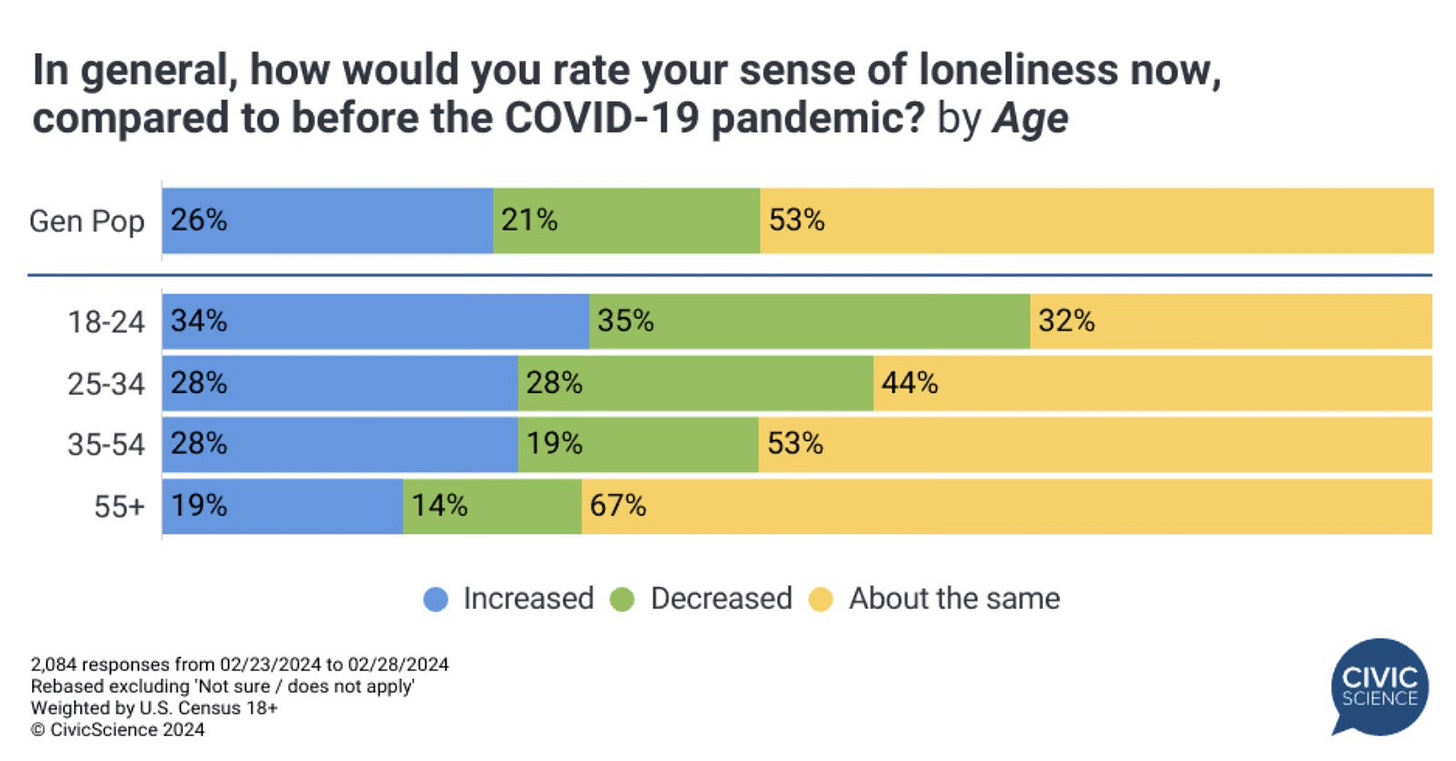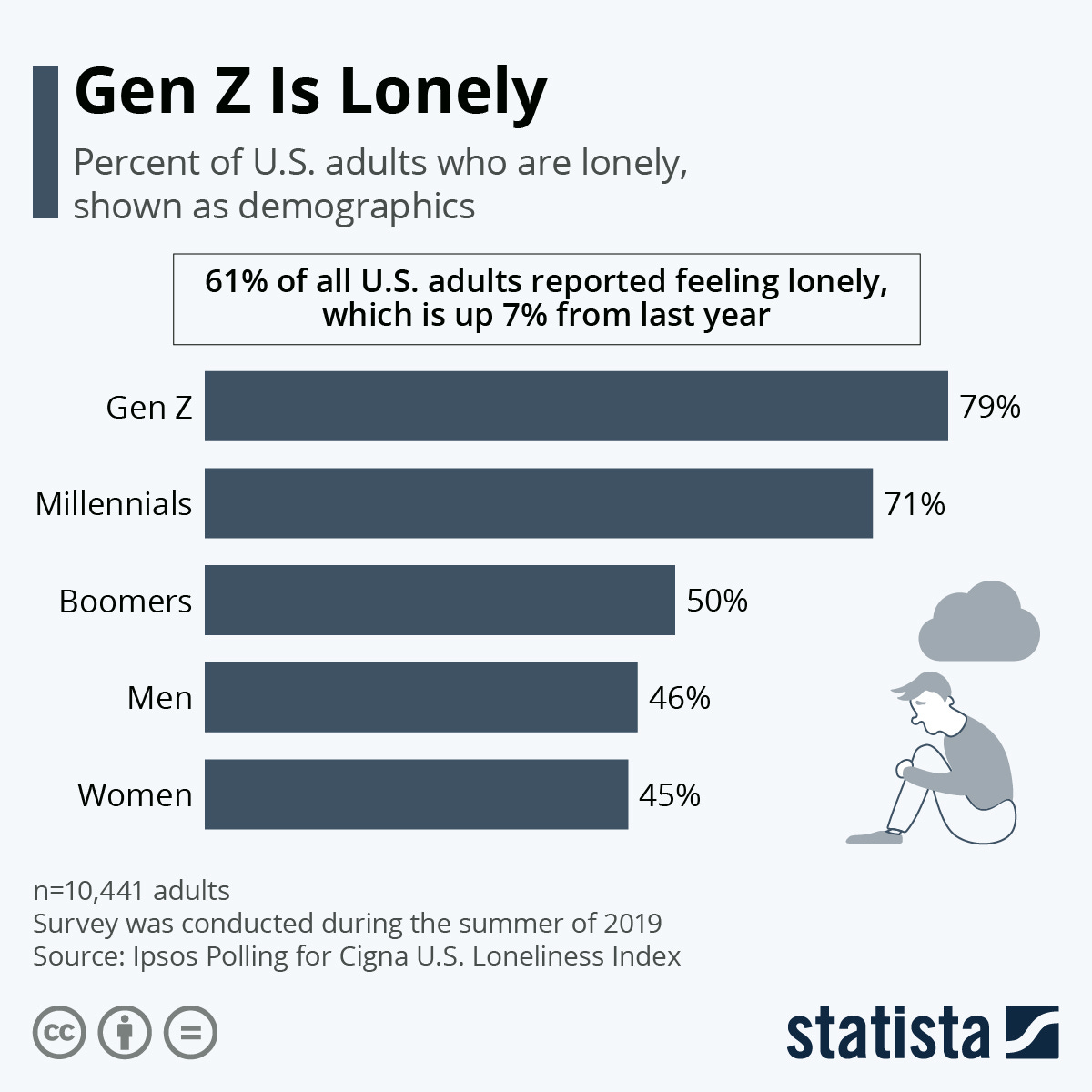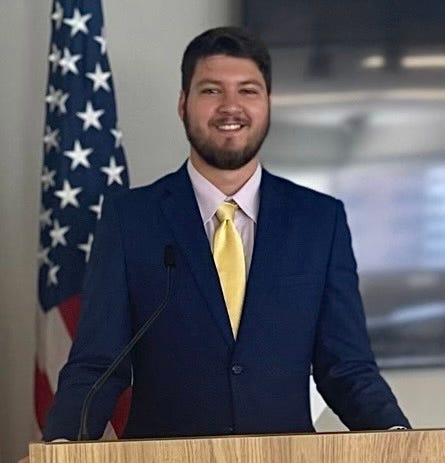Today, more people feel lonelier than ever before. I mean come on my dudes, have you seen the people who are proposing to ChatGPT? Or the sad reality of men spending their hard-earned money on OnlyFans subscriptions, talking to performers as if they're in real relationships, and genuinely believing the affection they receive is personal? These are signs of a society that has digitized social bonds, and in the process has grown so starved for real-world connection, that even its simulations seem preferable to reality, no matter how isolating they may be in the end. Social bonds, something shown again and again to be biologically essential for human flourishing, have been replaced with a series of technological stand-ins that simulate connection without fulfilling its core emotional functions. Texting has taken the place of spontaneous, embodied conversation with your close friends; emailing has supplanted face-to-face collaboration with your work colleagues; artificial intelligence now offers what some would believe to be companionship through algorithms that are designed to simulate empathy; and pornography has become a substitute for physical intimacy, vulnerability, and long-term attachment.
Each of these replacements offers immediacy and convenience, they remove the "messy" parts of human connection.... but they lack the profound depth, much-needed reciprocity, and indispensable physical presence that define real human relationships. In other words, these are all things that provide just enough stimulation to dull our need for social bonds, but never enough to resolve it. It's akin to an alcoholic, or an opioid addict. They abuse their drug of choice to numb the pain of existence - to forget their sorrows - yet the drug itself is just making the sorrows worse in the end. We in the developed world, have become addicted to technology in order to resolve the pain of social isolation that the technology itself is causing.
You don’t need to be some enlightened asshole to realize this. You could be driving down a highway in modern America, look at the car right next to you, and witness a grown ass adult texting somebody while going 80 mph. People are not present. Their attention is directed toward devices designed to keep them stimulated but emotionally hollow. Everyone knows something is wrong. Everyone senses that things have become hollow, performative, and transactional. And yet, despite that awareness, it doesn't change the sad fact that grown ass adults keep checking their instagrams while going at 80 mph on the highway and feeling lonelier than ever while doing so.
Experts across disciplines have tried to pin down the root causes of this phenomenon. Psychologist Jonathan Haidt argues that social media has rewired adolescent development, making young people more anxious, fragile, and dependent on external validation. Sherry Turkle explored how the proliferation of technology has undermined our ability to talk to one another, empathize, and engage in nuanced conversations. Sebastian Junger points to the decline of communal belonging and the disintegration of the tribe, a social unit humans are deeply wired to thrive in. Johan Hari looks at the phenomenon of loneliness from a birds eye view, describing how modern society systematically disconnects us from meaningful work, nature, and collective identity. These writers don’t necessarily agree on every detail, but they all identify the same trajectory: a society that has forgotten the things that once made us feel seen, valued, and understood.

In my view, the most potent reason behind this social disintegration is not capitalism, nor technology in isolation, but rather the ham-fisted integration of digital technology (digital technology refers to anything this is computer-like, or something that depends on an algorithm to function) into every aspect of our lives - which has affected our behavior, identity, and perception. The integration of digital technology changed what we expect from each other, so much so that we now associate human interaction with something that should be added to our instagram stories. For those who live their lives in a digital context, relationships are no longer built through time, trust, and vulnerability. They are built through visibility, algorithmic efficiency, aesthetic appeal. This is such a big problem because I personally see it spilling out into the real world. People care more about being perceived than staying true to who they are. And in this performative environment, authenticity becomes not only rare, but difficult to even define. I can get into this in another article, but just as a side note: I believe that things have gotten so performative, that we are in the midst of a transition from a society built on institutional and interpersonal trust (such as trust in governments, in local communities, in cultural narratives, and in the basic decency of others) to a society that reconstructs trust through new modes of credibility—something that I like to call an 'authenticity economy.' In this emerging paradigm, trust would be based on perceived emotional transparency, consistency, and the ability to communicate vulnerability in real time. Trust will be earned through PERCEIVED (and I stress the word perceived) honesty, presence, and depth, not through personas or ideological conformity. Whether this framework can truly replace what’s been lost or whether it will break down into something that doesn't serve the common good, I think, remains an open question.
So what solutions are being explored? From what I see, the most common response to the loneliness epidemic is to seek top-down solutions. For example: The government should regulate tech companies! Social media companies should Impose age restrictions on social media! Local governments should fund community-building initiatives! These ideas aren’t without merit, but they miss a critical truth: governments, tech companies, and local communities aren’t independent forces with their own values or priorities—they reflect the attitudes, behaviors, and expectations of the people within them. It is a reflection of collective behavior. If the populace remains digitally fragmented and socially passive, policy will reflect that fragmentation. Real, lasting change has to come from the ground up— in other words, the solution to the loneliness epidemic is up to the individual. It's a paradoxical solution, why would the solution to such an individual problem like loneliness be up to the individual? Well, just look at me, I've found that in my own life, the cure to my loneliness was up to me. No government, tech innovation, or local government effort has done anything help me out. So what was I supposed to do? Lie and wait in my bed for Mark Zuckerberg's hologram to keep me company? (Hey Meta, let me tell you about a crazy new idea, I just need you to give me a few million).
So all this means the response must be as personal as it is political. We have to cultivate practices that resist the easy, dopamine-blasting distractions we’re offered. That starts with things like turning off our phones at meals, engaging in uninterrupted conversation, reclaiming leisure as a time for reflection rather than endless consumption, and learning to tolerate discomfort without reaching for a screen to start the next doom-scrolling session. It means valuing silence and solitude not as voids to be filled with meaningless instagram reels, but as spaces where self-awareness and emotional depth can emerge.
Religious and spiritual traditions have long served as structures for this kind of reorientation. Communities of faith offer belonging, a moral compass, and purpose. And indeed, studies consistently show that participation in religious communities correlates with higher levels of happiness, life satisfaction, and resilience. I will add one caveat, however - when religion becomes dogma or tribalism, it can worsen the social isolation that it seeks to heal. What do we make of the person who declared his allegiance to the Islamic State and ran over innocent people on Bourbon Street in New Orleans? How much did religion help him and those around him? True spiritual transformation has its roots in humility and connection, not from a sense of superiority.
Now let's be absolutely clear, I use social media, you use social media - and technology is an integral part of my (and probably your) life - in fact, I don't see that changing any time soon (unless we're hit with a solar flare that brings us back to the Stone Age). I’ve experienced this loneliness myself. Like most people who were raised in the digital age, I’ve felt the sense of detachment that stems from superficial connection, and the persistent feeling of being surrounded by people and still feeling invisible. What changed things for me wasn’t a major life overhaul—it was the slow cultivation of a tight, dependable social circle. People who know me, people I know. That small network became my anchor. But most people don’t even have that. And when millions of people live without that kind of relational grounding, the consequences are the society we see today, with its political polarization, mass shootings, epidemic-level substance abuse, and the normalization of alienation.
Humans are wired to be in their little tribes. We need to be known, mirrored, and acknowledged. Thos are preconditions for psychological stability and social harmony. No app, algorithm, or AI assistant will ever be able to replace that what is uniquely human. And the longer we pretend they can, the further we as an industrialized society lose those social bonds, the more chaotic things will get.
This article is part of the Culture section.
About the Author: Marco Rodriguez is a political analyst and writer focusing on U.S. foreign policy, security, and global power dynamics. His work blends deep historical insight with sharp contemporary analysis. He is the creator of this Substack, where he explores the intersection of diplomacy, conflict, and leadership in the 21st century.







